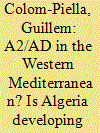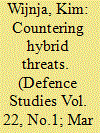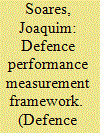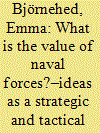|
|
|
Sort Order |
|
|
|
Items / Page
|
|
|
|
|
|
|
| Srl | Item |
| 1 |
ID:
186207


|
|
|
|
|
| Summary/Abstract |
The operational and strategic effects associated with the creation of defensive bastions in the seas off China, in Eastern Europe, or the Persian Gulf have prompted extensive military debate. The article aims to contribute to this debate by speculating on the potential creation of an Algerian A2/AD bubble in the Western Mediterranean. Such a zone does not appear to exist, but Algerian military developments allow it to monitor air and naval movements in an area comprising the Straits of Gibraltar, the Balearic Islands and Sardinia and to increase its capability to deny access to these parts, thus consolidating an AD zone with potential strategic effects.
|
|
|
|
|
|
|
|
|
|
|
|
|
|
|
|
| 2 |
ID:
186205


|
|
|
|
|
| Summary/Abstract |
The COVID-19 pandemic demonstrates once again that hybrid threats are increasingly challenging European countries. Although there is international cooperation on the conceptual level, individual countries are responsible for the actual implementation of counter hybrid measures. This article compares the approaches of Finland, Germany and the Netherlands to counter hybrid threats, while taking into consideration their strategic culture. It shows that the countries differ in their approach to counter hybrid threats in terms of their organisation of security and the scope of measures taken to deter adversaries. These differences are mainly rooted in historical, institutional and political processes. The countries are rather similar in detecting hybrid threats and responding to hybrid attacks, which can be explained by the nature of hybrid threats. Consequently, strategic culture is a context that shapes but not ultimately determines how Finland, Germany and the Netherlands counter hybrid threats. The results of this article suggest that our current understanding of strategic culture is insufficient to describe and explain an actor’s security policy in the contemporary security environment. It is recommended that the concept of strategic culture should be revised and has to be examined more broadly by including national security issues and a broad spectrum of instruments of power.
|
|
|
|
|
|
|
|
|
|
|
|
|
|
|
|
| 3 |
ID:
186209


|
|
|
|
|
| Summary/Abstract |
As the gap between strategic commitments and budgetary constraints continues to grow, defence organisations have introduced performance management initiatives to support decision-making and to improve governance. However, introducing managerial practices in public organisations, including defence, proves to be challenging. As performance management initiatives within defence suffer from an implementation gap, strategic benefits are not being harnessed. In our study, we first exploit the results of a systematic literature review to better anchor the encountered challenges within the literature. We then apply thematic analysis to a unique dataset from twelve NATO countries to propose a new defence-specific performance management framework for the strategic level. As the framework preserves the benefits of existing initiatives while mitigating most recorded challenges, it is proposed as a new guide for designing and assessing defence performance management efforts. Thereby, professionals and scholars are provided with a powerful instrument to address the implementation gap. Moreover, the theoretical and empirical lens adopted facilitates alignment between performance management initiatives, defence policy, defence strategy, and strategic objectives. Notably, policy goals and strategic “ends” are clearly connected to critical processes and resources. Thereby, the proposed framework better supports discussions with key defence stakeholders pertaining to the gap between commitments and constraints.
|
|
|
|
|
|
|
|
|
|
|
|
|
|
|
|
| 4 |
ID:
186206


|
|
|
|
|
| Summary/Abstract |
This article analyses how Sweden has adapted to the worsened security situation in its vicinity following Russia’s illegal annexation of Crimea and war in Eastern Ukraine. The paper builds on security policy research focused on neoclassic realism and small state strategies in order to explore how the, broadly unknown, security policy from 2009 has been implemented in practice since 2014, through what observers call the “Hultqvist doctrine.” The aim is to bring clarity to how the Hultqvist doctrine best can be understood – as a non-aligned or an integration policy? – and how the strategy relates to both systemic forces and domestic circumstances. The paper addresses the puzzle posed by structural realism, that the systemic forces would work to encourage Sweden to align in face of the threat that emerged in 2014. Still, Sweden has resisted NATO membership. To this end, I construct and apply an analytical framework that not only reveals the degree of novelty in the doctrine, but also allows for an evaluation of integration in three dimensions – openness, inclusiveness and comprehensiveness – in combination with a screening dimension. Following neoclassical realism, the study furthermore identifies domestic conditions that hinder policy flexibility.
|
|
|
|
|
|
|
|
|
|
|
|
|
|
|
|
| 5 |
ID:
186203


|
|
|
|
|
| Summary/Abstract |
Massive chain reaction among the orbital debris population, also known as Kessler Syndrome, is generally perceived as a universally hostile scenario. However, the article argues that intentional massive pollution of orbits might be a tool in weak space powers’ strategic arsenal. Given the technological restrictions and irreversible escalatory potential of such a step, its utilization is, nonetheless, extremely limited. It is argued that total spoiling of the utilization of space services and access to outer space would be viable only to a very low number of actors in scenarios of grave threat to their existence, territorial integrity or survival of their regimes.
|
|
|
|
|
|
|
|
|
|
|
|
|
|
|
|
| 6 |
ID:
186208


|
|
|
|
|
| Summary/Abstract |
The arrival of Hugo Chavez (1999–2013) to the government profoundly altered the role of the armed forces in the Venezuela political system. In this article we argue that Hugo Chávez’s government took the military to the field of politics by turning them into important political actors and Maduro’s governments (2013 -present) grants them a high degree of autonomy in politics and economics according to a model of political and ideological behavior. We advance our argument by proposing and testing the political and ideological model of military behavior through dissecting important events and dimensions (of the political, economic, and ideological nature) in Chávez and Maduro’s administrations. Through these events, the article aims to explain how the transformation of the armed forces into a political actor during the Chavista governments happened.
|
|
|
|
|
|
|
|
|
|
|
|
|
|
|
|
| 7 |
ID:
186204


|
|
|
|
|
| Summary/Abstract |
There are several, often mentioned, strategic and tactical advantages related to naval forces which occur as a result of their inherent characteristics. Because they possess both mobility and a light footprint, naval forces have the ability to be simultaneously present in a given place while being minimally intrusive, a feat no other service branch can accomplish: “[t]he fact that naval forces can ´loiter´ and be minimally intrusive is an important and unique contribution to deterrence. The Army can loiter, but it cannot be minimally intrusive; the Air Force can be minimally intrusive but it cannot loiter. Only naval forces can do both simultaneously” (UK Maritime Power 2017, 37). Moreover, with the sea as the area of operations naval forces are an essential instrument for the state not only in war, but in peacetime as well. In comparison to the army and air force, naval forces are useful to the state outside a war context as they provide prosperity to the state through the protection of shipping lanes and civilian vessels. Given these inherent and unique characteristics and our unchanging dependence on the sea for goods and trade, the value of naval forces would seem self-evident.
|
|
|
|
|
|
|
|
|
|
|
|
|
|
|
|
|
|
|
|
|